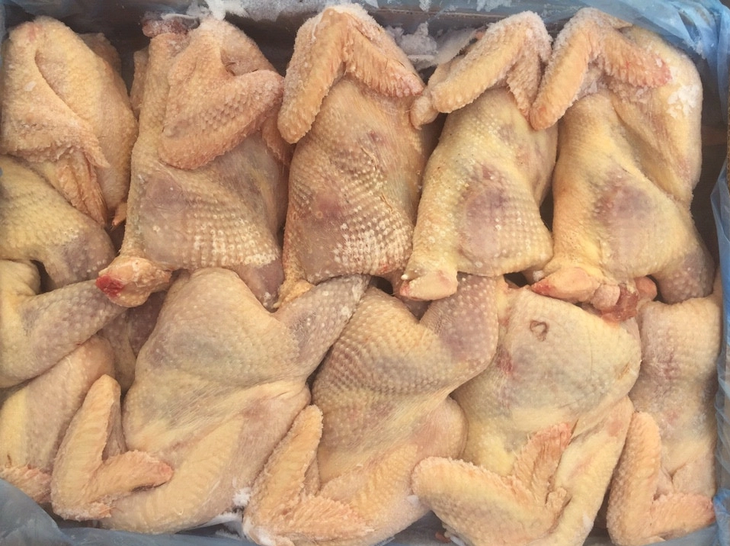Tens of thousands of metric tons of frozen discarded chicken is smuggled into Vietnam each month, putting the local poultry farming sector at a disadvantage, according to the Vietnam Poultry Association (VIPA).
Discarded chickens are mainly hens that could not lay eggs anymore and those with congenital abnormalities or diseases. They are processed into animal feed in many countries.
The association on Wednesday wrote to the prime minister and relevant ministries proposing solutions to remove obstacles facing the domestic poultry sector.
VIPA affirmed that the illegal transport and trade of poultry products into Vietnam remain rampant in the localities which share borders with other countries, especially those in the central and southern regions.
The smuggling of discarded chicken has increased the risk of transmitting bird flu viruses and dangerous infectious diseases to Vietnam, as well as seriously affecting the local poultry farming sector.
A large volume of low-cost poultry by-products, including chicken feet, heads, necks, wings, internal organs, and frozen chickens without heads, feet, and internal organs are continuously imported into Vietnam.
If the situation is not put under control, the local poultry sector will face further difficulties and the health of local consumers will be at risk.
VIPA suggested the Ministry of Agriculture and Rural Development coordinate with the Ministry of Public Security, the Ministry of National Defense, and localities to regularly launch inspections to prevent and strictly handle individuals and organizations involved in the illegal cross-border poultry product transport and trade.
Vietnam’s regulations on livestock importation are unclear and ineffective compared to other countries', according to VIPA.
For instance, the use of Ractopamine, an animal feed additive used to promote leanness and increase food conversion efficiency in farmed animals, and Cysteamine, which can increase the growth hormone level in the blood to spur animal growth, has been banned in 160 countries and territories worldwide, including Vietnam, since 2014 as they pose a risk of causing cancer to eaters.
However, Vietnam annually imports a large volume of pork, beef, and chicken from countries which allow the usage of these two hormones.
Meanwhile, Vietnamese enterprises must meet the strict requirements of the countries it exports to.
Vietnam’s chicken imports have risen continuously over the past five years, accounting for 20-25 percent of the total chicken volume consumed in Vietnam, according to statistics from the General Department of Vietnam Customs.
Therefore, VIPA proposed that the government ban the import of meat products from countries which allow the use of Ractopamine and Cysteamine in order to create a healthy and fair environment for domestic enterprises and farmers and not to harm the health of consumers.
The association also suggested the Ministry of Agriculture and Rural Development and other relevant ministries and agencies adopt non-tariff measures to protect local production and consumers’ health.
Like us on Facebook or follow us on Twitter to get the latest news about Vietnam!





















































